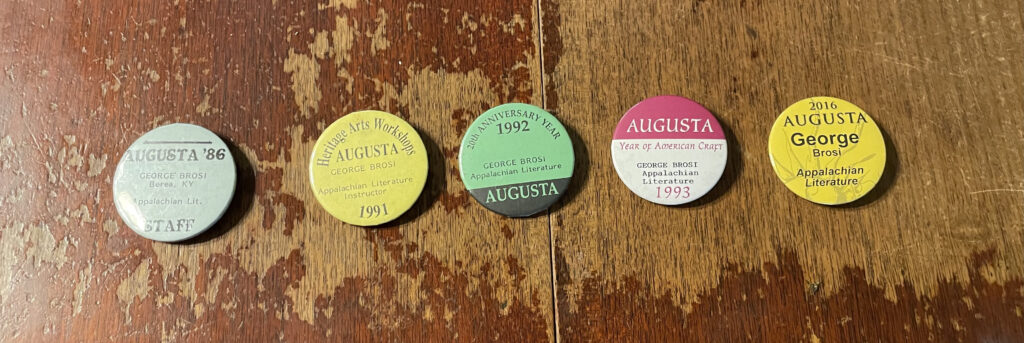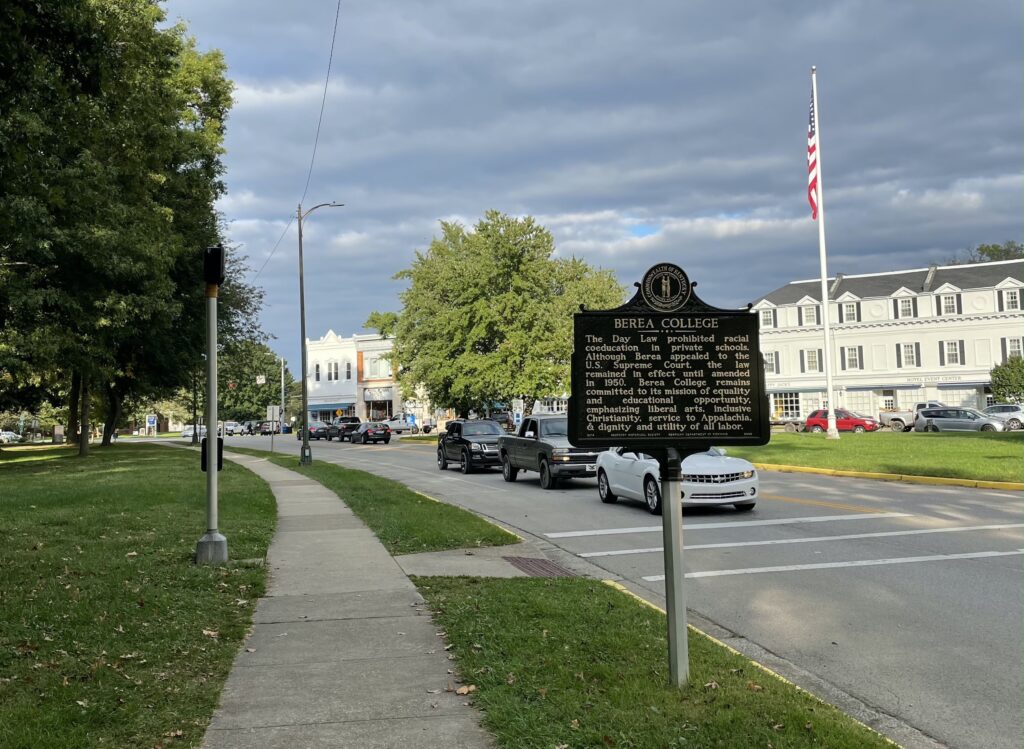During a trip to Berea, Kentucky, I visited with George Brosi, owner of Appalachian Mountain Books. In 1979, George and his late wife, Connie, sold new books for the Appalachian Book and Record store in Berea. They established Appalachian Mountain Books in 1982 and started traveling around the region to buy used books. George has also been a denizen of the Augusta Festival, which is how I was introduced to him. He sold books at the festival and taught Augusta’s Appalachian Literature class in previous years. As an avid reader and resident of Appalachia, I was eager to learn about the genre of Appalachian literature from someone deeply involved in the field.

I didn’t read many books about Appalachia while I was growing up in West Virginia, but working at Augusta has given me the opportunity and resources to dive into the literature. In recent years, I’ve observed a couple memoirs, Hillbilly Elegy and The Glass Castle, achieve rapid national attention. In the moments of literary fervor, the books sparked discussion and controversy, and it seemed like people across the country were invested in or at least thinking about the people in Appalachia. Although it’s great to see Appalachian literature succeed on a national scale, one book can be amplified so much as to overshadow a genre of literature and diverse experiences. While I had thought about what Appalachian books can do for outsiders, George spoke about what Appalachian books can do for Appalachians.
George has a background in activism related to civil rights and poverty. In 1962, he picketed a segregated laundromat in his Tennessee hometown as a teenager and has been involved in civil rights, environmental, and peace efforts ever since. His involvement in social movements shaped the way he moves through life and views his book shop.

George sees the bookshop as a way for him to contribute to the “beloved community,” a term coined by theologian Josiah Royce and popularized by Martin Luther King Jr. George explained his understanding that “the basic idea is that in order to achieve a beloved community it takes work on all three of the levels of action.” The first level being the individual, then a community with shared goals, and finally, collective effort between different groups to achieve overarching peace and equity. George told me that “The beloved community demands that individuals be treated with respect, and… despite poverty [and] stereotypes, they can overcome obstacles and feel good about themselves. And unless you feel good about yourself, you can’t really join in any collective effort. At the next level, the beloved community wants you to work with other like-minded people in a way that respects your individuality and your goals of replacing exploitation and hate with love… [W]hether it’s a civil rights group or Hispanic Americans or whatever, that group relates to each other in a positive, loving way and then together they work to change the institutions of society.”
Although the idea of the beloved community is tied to the Civil Rights Movement, Appalachians have also been stereotyped and exploited. George told me that “In the late 70s and early 80s, people would look at my book display and would say ‘Oh my gosh, I had no idea there were that many books written about us.’ And, of course, many of the books are helping people to overcome stereotypes, helping people to overcome poverty, helping people to work together in a loving way and helping people to work for institutional change.” Although George covers all Appalachian books, he prefers to highlight and review books that “illuminate” diversity or are working for positive change.
Literature has the power to contribute to stereotypes, but hearing stories from people in the mountains can also give glimpses into unique and collective experiences of people here, preserve history, and connect people across the region. Scholarship on Appalachia can empower people to confront systemic issues or help people understanding the larger forces impacting their lives. Appalachian literature reflects the diverse communities and complex histories of the region, and reading only the Appalachian books in the national spotlight just isn’t enough to really understand a place or its people. If you want to learn more about Appalachia, read broadly and take advantage of the robust literature.
To help anyone looking to pick up a book, George kindly shared with me a list of Appalachian books he recommends for anyone interested in reading about the region.
Regional History
Appalachia: A History by John Alexander Williams (2002)
Where There are Mountains: An Environmental History of the Southern Appalachians by Donald Edward Davis (2003)
Appalachian culture
Classic:
The Spirit of the Mountains by Emma Bell Miles (1905)
Recent:
All that is Native and Fine: The Politics of Culture in an American Region by David E. Whisnant (2009)
Memoir and Biography
Arms Wide Open: A Midwife’s Journey by Patricia Harman (2011)
Dolly: My Life and Other Unfinished Business by Dolly Parton (1994)
I Thunk Me a Thaut by Will McCall (1975)
Singing Family of the Cumberlands by Jean Ritchie (1955)
Coal
Soul Full of Coal Dust: A Fight for Breath and Justice in Appalachia by Chris Hamby (2020)
Opioid Crisis
Dopesick: Dealers, Doctors, and the Drug Company that Addicted America by Beth Macy (2019)
Cherokees
The Cherokee Nation, A History by Robert J. Conley (2005)
Black Appalachian Non-Fiction
ELY: An Autobiography by Ely Green (1966)
Gone Home: Race and Roots through Appalachia by Karida L. Brown (2018)
Colored People: A Memoir by Henry Louis Gates (1994)
Novels
Classic:
The Dollmaker by Harriette Simpson Arnow (1954)
River of Earth by James Still (1940)
Recent:
Serena by Ron Rash (2009)
Stay and Fight by Madeline Fitch (2020)
Short Stories
Classic:
I Am One of Your Forever by Fred Chappell (1987)
Kinfolks by Gurney Norman (1977)
The Hawk’s Done Gone by Mildred Haun (1940)
Recent:
The Stories of Breece D’J Pancake (1983)
Me and My Baby View the Eclipse by Lee Smith (1990)
Appalachian Gateway: An Anthology of Contemporary Appalachian Stories and Poetry edited by George Brosi and Kate Egerton (2013)
Poetry
Classic:
Brier: His Book by Jim Wayne Miller (1988)
Hounds on the Mountains by James Still (1939)
Recent:
Appalachia by Charles Wright (1998)
Cherokee Fiction
Even As We Breathe by Annette Saunooke Clapsaddle (2020)
Black Appalachian Fiction
Birds of Opulence by Crystal E. Wilkinson (2016)
Black Appalachian Poetry
The Selected Poems of Nikki Giovanni (1996)
Perfect Black by Crystal Wilkinson (2021)


George Brosi is a national treasure. Good to see his smiling face again.
I have also grown up in Appalachia and not read much literature published by Appalachian authors. I took a class last semester for Appalachian literature and I’ve learned that I really enjoy it. This piece inspires me to find new Appalachian authors to read their works and I think it will also inspire others to look into these authors.
But…where are Appalachian songs in this list? One of Appalachia’s most widespread and loved contributions to the beloved community, surely….
This piece makes me want to learn more about the Appalachian culture because I want quit aware about it until reading this article. It is very interesting to know that there is a lot more cultures and regions out there that we should all be aware of and learn. This piece makes me want to visit the bookstore and read an Appalachian book and become more educated on this region.
I am a heavy reader, but I must admit I have not read much Appalachian literature. I regret not reading more Appalachian literature, and perhaps after reading this, I will. This literature is so rich with culture and emotion, as well as wonderful writers. I am excited to pick up my next book!
Having previously been a student at Berea College and now being a student employee at Augusta, I have learned a tremendous amount about Appalachian Culture and Heritage. While I’ve never met George his passion for Appalachia and Literature are very obvious and I’d love to visit his bookstore in the future. I think the way this article focuses not just on the literature of Appalachia but also on social justice and the concept of beloved community makes it feel very well rounded. The book list to me feels almost like a call to action necessitating that I read a few selections and learn more about the region. I’d love to see a more in depth interview with George as I’m sure he has a wealth of knowledge to share.